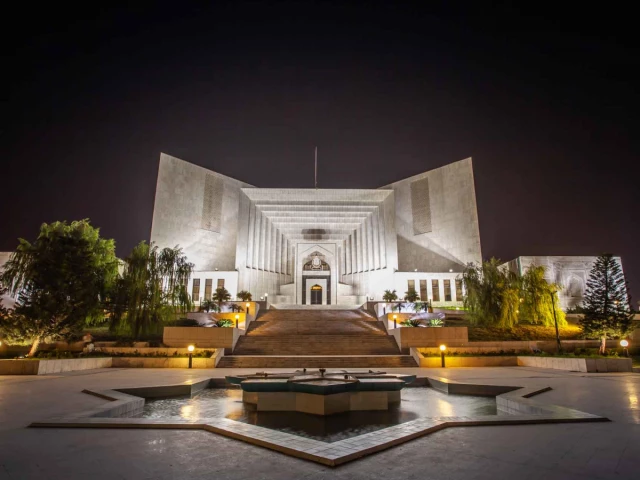Revised code requires judges to keep their conduct impeccable, avoid any conduct that raises questions of propriety
The Supreme Judicial Council has approved changes to the code of conduct for Supreme Court and High Court judges. The amendment prohibits judges from speaking to the media on legal or political issues and from attending or presiding over public events while in office.
The Supreme Judicial Council (SJC) meeting was chaired by the Chief Justice of Pakistan, Justice Yahya Afridi, at the Supreme Court of Pakistan. Justice Syed Mansoor Ali Shah and Justice Munib Akhtar attended the proceedings virtually, while Miss Aalia Neelum, Chief Justice of Lahore High Court, and Justice Sardar Muhammad Sarfraz Dogar, Chief Justice of Islamabad High Court, were present in person.
The revised code states that judges must maintain their conduct above reproach and refrain from conduct that may raise questions of propriety. “To be above reproach, and to this end to keep his conduct in all things, official and private, free from impropriety, is expected of a judge,” Article III of the Revised Code states.
The changes strengthen the existing expectations of withdrawal where there are conflicts of interest. Judges are not required to hear cases involving their own interests or the interests of close relatives. “A judge must resolutely decline to act in a case involving his own interests, including the interests of persons whom he considers and treats as close relatives or close [friends],” reads Article IV. It further provides that “A judge shall strictly refrain from entering into or continuing any business, however trifling, with any party to any cause before him.”
As a significant addition, it also prohibits judges from participating in public debate or political discussion, particularly through the media. “A judge should not engage in any public controversy, whether by way of speech, writing, debate or comment in any forum, and least of all in matters of policy, even if such matters involve a question of law.”
The article further notes: “He must not have any interaction with the media, especially in relation to matters that may give rise to public debate or adversely affect institutional collegiality and discipline.”
If public allegations are made against a judge, the Code provides for a formal reporting mechanism. “He may place the matter in writing before a committee consisting of the Chief Justice of Pakistan and four senior judges of the Supreme Court of Pakistan through its Registrar for an appropriate institutional response.”
Judges are further instructed to avoid any public comment on judicial or administrative matters. “He shall not cause any judicial or administrative matter to be discussed in public, nor shall he publish any announcement relating to his personal or official affairs.”
In terms of financial conduct, the Code warns against involvement in trade, industry or speculative investment. “A judge should endeavor as far as possible to avoid becoming involved in litigation either on his own behalf or on behalf of others. In particular, he should not involve himself in activities such as industry, commerce or speculative transactions, for the pursuit of wealth can never be the goal of a judge.”
It also warns: “Using the influence of one’s position to gain undue advantage, whether immediate or future, is a grave mistake.
The changes restrict judges from participating in organizational roles or political activities. Article VII notes: “Extrajudicial duties or responsibilities, official or private, should generally be avoided. He should also avoid being a candidate for any elective office in any organization whatsoever.”
With regard to gifts and hospitality, the code states: “Gifts may be received only from close relatives and close friends, and only such as are customary. Everything in the way of favors arising from office must be rejected.”
Further, it also added, “A Senior Judge would not accept an invitation to a dinner/reception to be held in his honor from an individual member of the Bar.”
The amended code also emphasizes timely justice. “A judge shall take all steps to dispose of cases in the shortest possible time, control the efforts made to prevent early disposal of cases, and make every effort to minimize suffering to the litigants by disposing of cases expeditiously through proper written judgments.”
To protect judicial independence, Article XV outlines steps to report undue influence. “The judge shall immediately notify the relevant Chief Justice of the Supreme Court, the Chief Justice of Pakistan and four senior judges of the Supreme Court through the respective Registrars in writing.”
In such cases, the matter must be submitted to a committee and decided within a specified time limit. “The committee’s decision on the report must be made within fourteen days.”
If the committee does not respond in time, the code mandates escalation. “If the Chief Justice or the Committee in the matter of the Supreme Court, as the case may be, fails to respond within the prescribed time frame, the Chief Justice of Pakistan along with four senior judges of the Supreme Court will take up the matter.”
As part of the meeting, the council also reviewed 74 complaints filed against judges. In the first phase, 67 complaints were processed, of which 65 were rejected, one was postponed and one was approved for further processing by majority vote.
Later, due to the disqualification of Chief Justice of Islamabad High Court from matters on the agenda, the council was reconstituted with the inclusion of Justice SM Attique Shah, Chief Justice of Peshawar High Court. At this stage, seven further complaints were reviewed – five were rejected unanimously, while two were allowed to proceed.
With the settlement of these 74 complaints, the total number of cases dealt with by the council since October 2024 has reached 155, while 87 complaints remain pending for preliminary hearing.



